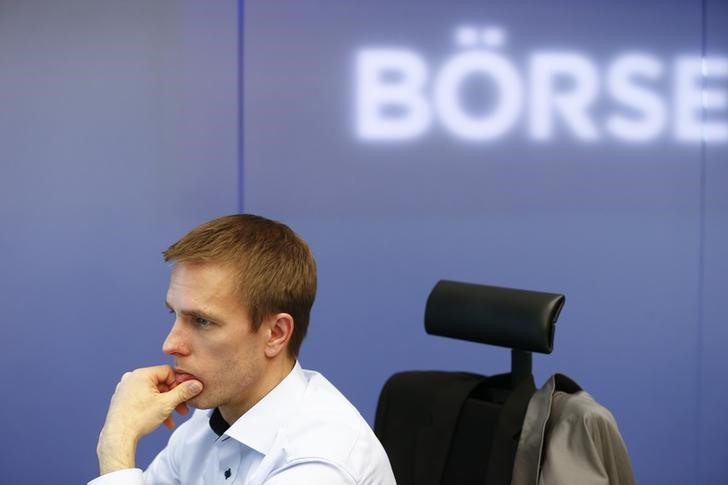Investing.com – European stocks traded slightly higher on Tuesday as investors continued to weigh concern over political risks and digest corporate earnings.
Nearing midday in Europe, the benchmark Euro Stoxx 50 inched up 0.08%, France’s CAC 40 gained 0.13%, and Germany’s DAX 30 rose 0.36%.
The possibility of a win by the far-right party led by Marine Le Pen in France’s presidential elections this spring continued to put pressure on French 10-year bonds, hitting their weakest level in 18 months and widening the gap when compared to the safe haven German bund.
The risk premium on the French sovereign debt hit 77 basis points, its highest level since 2012.
Greek bonds also remained under pressure with the 10-year yield having risen nearly 30 basis points this week and the 2-year return nearing 10% as investors demanded more return on their investment in order to compensate the risk of default.
The move came as the International Monetary Fund (IMF) revealed that the group was in disagreement on its evaluation of what terms Greece should stick to in its bailout. Though “most” agreed Athens was on track to achieve a surplus of 1.5% of GDP and needed no further austerity measures, “some” argued that it should tighten further to hit 3.5%.
In big moves on earnings, shares of BNP Paribas (PA:BNPP) fell more than 4%, leading decliners on the Euro Stoxx 50 lower, as the French bank missed earnings estimates and warned of “lackluster market”.
Pandora (CO:PNDORA) saw shares sink 5% after the Danish jewelry maker cut its 2017 revenue forecast.
BP (LON:BP) tumbled nearly 3% after the oil giant reported that earnings hit a 10-year low.
Munich Re (DE:MUVGn) fell around 1% as the German reinsurer saw profit fall 16% in 2016, coming in just under estimates.
Statoil (OL:STL) lost more than 1% as a $2.3 billion dollar impairment charge force the Norwegian oil firm to post a net operating loss of $1.9 billion dollars.
On the economic front, German industrial production fell 3.0% in December, missing forecasts for a 0.3% rise.
The U.K. saw retail sales fall 0.6% in January, missing consensus expectations of a 0.8% rise, while housing prices fell 0.9% in the first month of the year, compared to forecasts for a 0.2% increase.
Meanwhile, oil prices were slightly lower on Monday, holding in a familiar trading range as market players continued to weigh the prospect of production cuts by major crude-producing nations against a rise in U.S. drilling.
Energy stocks were trading mixed, as French oil and gas major Total SA (PA:TOTF) gained 0.12%, Italy’s ENI (MI:ENI) advanced 0.56%, while Norwegian rival Statoil (OL:STL) slumped 1.41%.
Financial stocks were broadly lower, as French lenders BNP Paribas (PA:BNPP) and Societe Generale (PA:SOGN) slumped 4.17% and 2.08%, while Germany’s Deutsche Bank (DE:DBKGn) fell 0.24%. Commerzbank (DE:CBKG) broke the general trend, rising 0.15%.
Among peripheral lenders, Italy’s Intesa Sanpaolo (MI:ISP) fell 0.64% and Unicredit (MI:CRDI) dropped 0.57%, while Spanish bank BBVA (MC:BBVA) slipped 0.10% and Banco Santander (MC:SAN) traded down 1.24%
In London, the commodity-heavy FTSE 100 rose 0.47% as exporters benefitted from the weaker pound.
Shares in Glencore (LON:GLEN) advanced 0.82%, Anglo American (LON:AAL) rose 1.32%, while BHP Billiton (LON:BLT) and Rio Tinto (LON:RIO) gained 1.48% and 1.77%, respectively.
Energy stocks traded mixed, as BP (LON:BP) slumped 2.57% and rival Royal Dutch Shell (LON:RDSa) gained 0.51%.
Financial stocks were mostly higher as shares in HSBC Holdings (LON:HSBA) traded up 0.39% and the Royal Bank of Scotland (LON:RBS) dropped 0.49%, while Barclays (LON:BARC) and Lloyds Banking (LON:LLOY) rose 0.46% and 0.64%, respectively.
In the U.S., Wall Street pointed a slightly higher open. The Dow Jones Industrial Average futures rose 0.16%, S&P 500 futures edged forward 0.09%, while the Nasdaq 100 futures added on 0.05%.
